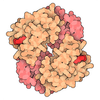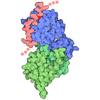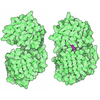+ Open data
Open data
- Basic information
Basic information
| Entry | Database: PDB / ID: 9b9v | ||||||
|---|---|---|---|---|---|---|---|
| Title | Cryo-EM structure of the ZBTB9 BTB domain filament | ||||||
 Components Components | Zinc finger and BTB domain-containing protein 9 | ||||||
 Keywords Keywords | TRANSCRIPTION / BTB domain / transcription factor / ZBTB protein | ||||||
| Function / homology |  Function and homology information Function and homology informationDNA-binding transcription factor activity, RNA polymerase II-specific / RNA polymerase II cis-regulatory region sequence-specific DNA binding / regulation of transcription by RNA polymerase II / zinc ion binding / identical protein binding / nucleus Similarity search - Function | ||||||
| Biological species |  Homo sapiens (human) Homo sapiens (human) | ||||||
| Method | ELECTRON MICROSCOPY / helical reconstruction / cryo EM / Resolution: 8.1 Å | ||||||
 Authors Authors | Park, J. / Hunkeler, M. / Fischer, E.S. | ||||||
| Funding support | 1items
| ||||||
 Citation Citation |  Journal: Mol Cell / Year: 2024 Journal: Mol Cell / Year: 2024Title: Polymerization of ZBTB transcription factors regulates chromatin occupancy. Authors: Paul M C Park / Jiho Park / Jared Brown / Moritz Hunkeler / Shourya S Roy Burman / Katherine A Donovan / Hojong Yoon / Radosław P Nowak / Mikołaj Słabicki / Benjamin L Ebert / Eric S Fischer /  Abstract: BCL6, an oncogenic transcription factor (TF), forms polymers in the presence of a small-molecule molecular glue that stabilizes a complementary interface between homodimers of BCL6's broad-complex, ...BCL6, an oncogenic transcription factor (TF), forms polymers in the presence of a small-molecule molecular glue that stabilizes a complementary interface between homodimers of BCL6's broad-complex, tramtrack, and bric-à-brac (BTB) domain. The BTB domains of other proteins, including a large class of TFs, have similar architectures and symmetries, raising the possibility that additional BTB proteins self-assemble into higher-order structures. Here, we surveyed 189 human BTB proteins with a cellular fluorescent reporter assay and identified 18 ZBTB TFs that show evidence of polymerization. Through biochemical and cryoelectron microscopy (cryo-EM) studies, we demonstrate that these ZBTB TFs polymerize into filaments. We found that BTB-domain-mediated polymerization of ZBTB TFs enhances chromatin occupancy within regions containing homotypic clusters of TF binding sites, leading to repression of target genes. Our results reveal a role of higher-order structures in regulating ZBTB TFs and suggest an underappreciated role for TF polymerization in modulating gene expression. | ||||||
| History |
|
- Structure visualization
Structure visualization
| Structure viewer | Molecule:  Molmil Molmil Jmol/JSmol Jmol/JSmol |
|---|
- Downloads & links
Downloads & links
- Download
Download
| PDBx/mmCIF format |  9b9v.cif.gz 9b9v.cif.gz | 676.9 KB | Display |  PDBx/mmCIF format PDBx/mmCIF format |
|---|---|---|---|---|
| PDB format |  pdb9b9v.ent.gz pdb9b9v.ent.gz | 471.8 KB | Display |  PDB format PDB format |
| PDBx/mmJSON format |  9b9v.json.gz 9b9v.json.gz | Tree view |  PDBx/mmJSON format PDBx/mmJSON format | |
| Others |  Other downloads Other downloads |
-Validation report
| Arichive directory |  https://data.pdbj.org/pub/pdb/validation_reports/b9/9b9v https://data.pdbj.org/pub/pdb/validation_reports/b9/9b9v ftp://data.pdbj.org/pub/pdb/validation_reports/b9/9b9v ftp://data.pdbj.org/pub/pdb/validation_reports/b9/9b9v | HTTPS FTP |
|---|
-Related structure data
| Related structure data |  44391MC 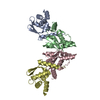 9b9rC M: map data used to model this data C: citing same article ( |
|---|---|
| Similar structure data | Similarity search - Function & homology  F&H Search F&H Search |
- Links
Links
- Assembly
Assembly
| Deposited unit | 
|
|---|---|
| 1 |
|
- Components
Components
| #1: Protein | Mass: 19387.961 Da / Num. of mol.: 14 / Fragment: BTB domain Source method: isolated from a genetically manipulated source Source: (gene. exp.)  Homo sapiens (human) / Gene: ZBTB9 / Cell line (production host): High Five / Production host: Homo sapiens (human) / Gene: ZBTB9 / Cell line (production host): High Five / Production host:  Trichoplusia ni (cabbage looper) / References: UniProt: Q96C00 Trichoplusia ni (cabbage looper) / References: UniProt: Q96C00 |
|---|
-Experimental details
-Experiment
| Experiment | Method: ELECTRON MICROSCOPY |
|---|---|
| EM experiment | Aggregation state: FILAMENT / 3D reconstruction method: helical reconstruction |
- Sample preparation
Sample preparation
| Component | Name: ZBTB9 BTB domain filament / Type: COMPLEX / Entity ID: all / Source: RECOMBINANT | |||||||||||||||||||||||||
|---|---|---|---|---|---|---|---|---|---|---|---|---|---|---|---|---|---|---|---|---|---|---|---|---|---|---|
| Source (natural) | Organism:  Homo sapiens (human) Homo sapiens (human) | |||||||||||||||||||||||||
| Source (recombinant) | Organism:  Trichoplusia ni (cabbage looper) / Strain: High Five Trichoplusia ni (cabbage looper) / Strain: High Five | |||||||||||||||||||||||||
| Buffer solution | pH: 7.4 Details: 50 mM HEPES/NaOH pH 7.4, 200 mM NaCl, 0.25 mM CHAPSO, 1 mM TCEP | |||||||||||||||||||||||||
| Buffer component |
| |||||||||||||||||||||||||
| Specimen | Conc.: 0.95 mg/ml / Embedding applied: NO / Shadowing applied: NO / Staining applied: NO / Vitrification applied: YES Details: Elution fractions from Strep-tag affinity chromatography were dialyzed overnight against 50 mM HEPES/NaOH pH 7.4, 200 mM NaCl, 1 mM TCEP and concentrated by centrifugation. | |||||||||||||||||||||||||
| Specimen support | Details: Grids were glow-discharged for 60 s at 15-20 mA and 39 Pa Grid material: COPPER / Grid mesh size: 300 divisions/in. / Grid type: Quantifoil R1.2/1.3 | |||||||||||||||||||||||||
| Vitrification | Instrument: LEICA EM GP / Cryogen name: ETHANE / Humidity: 90 % / Chamber temperature: 283 K Details: Grids were vitrified using a Leica EM GP plunge freezer operated at 90% humidity and 10 C with 10 s pre-blot, 3 s blot, 3 s post-blot. |
- Electron microscopy imaging
Electron microscopy imaging
| Experimental equipment | 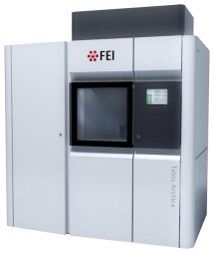 Model: Talos Arctica / Image courtesy: FEI Company |
|---|---|
| Microscopy | Model: FEI TALOS ARCTICA |
| Electron gun | Electron source:  FIELD EMISSION GUN / Accelerating voltage: 200 kV / Illumination mode: FLOOD BEAM FIELD EMISSION GUN / Accelerating voltage: 200 kV / Illumination mode: FLOOD BEAM |
| Electron lens | Mode: BRIGHT FIELD / Nominal magnification: 36000 X / Nominal defocus max: 2000 nm / Nominal defocus min: 800 nm / Cs: 2.7 mm / C2 aperture diameter: 50 µm / Alignment procedure: COMA FREE |
| Specimen holder | Cryogen: NITROGEN / Specimen holder model: FEI TITAN KRIOS AUTOGRID HOLDER |
| Image recording | Average exposure time: 4.5 sec. / Electron dose: 50.1 e/Å2 / Film or detector model: GATAN K3 (6k x 4k) / Num. of grids imaged: 1 / Num. of real images: 1137 Details: 1 movie (45 frames) was acquired per hole and stage position. |
- Processing
Processing
| EM software | Name: PHENIX / Version: 1.21.1_5286 / Category: model refinement | ||||||||||||||||||||||||
|---|---|---|---|---|---|---|---|---|---|---|---|---|---|---|---|---|---|---|---|---|---|---|---|---|---|
| CTF correction | Type: PHASE FLIPPING AND AMPLITUDE CORRECTION | ||||||||||||||||||||||||
| Helical symmerty | Angular rotation/subunit: 101.9 ° / Axial rise/subunit: 36.1 Å / Axial symmetry: C1 | ||||||||||||||||||||||||
| Particle selection | Num. of particles selected: 2022676 | ||||||||||||||||||||||||
| 3D reconstruction | Resolution: 8.1 Å / Resolution method: FSC 0.143 CUT-OFF / Num. of particles: 147135 / Algorithm: FOURIER SPACE Details: Asymmetric helical refinement followed by local refinement led to the final reconstruction. The helical symmetry values represent the angular rotation and axial rise for two dimers at the ...Details: Asymmetric helical refinement followed by local refinement led to the final reconstruction. The helical symmetry values represent the angular rotation and axial rise for two dimers at the core of the map, where the local resolution was the highest. These values, however, were not applied during helical refinement as they did not improve the quality of the final reconstruction. Symmetry type: HELICAL | ||||||||||||||||||||||||
| Atomic model building | B value: 762 / Protocol: OTHER / Space: REAL / Details: Real-space refinement without local grid search | ||||||||||||||||||||||||
| Atomic model building | Source name: AlphaFold / Type: in silico model | ||||||||||||||||||||||||
| Refinement | Cross valid method: NONE Stereochemistry target values: GeoStd + Monomer Library + CDL v1.2 | ||||||||||||||||||||||||
| Displacement parameters | Biso mean: 177.76 Å2 | ||||||||||||||||||||||||
| Refine LS restraints |
|
 Movie
Movie Controller
Controller




 PDBj
PDBj

